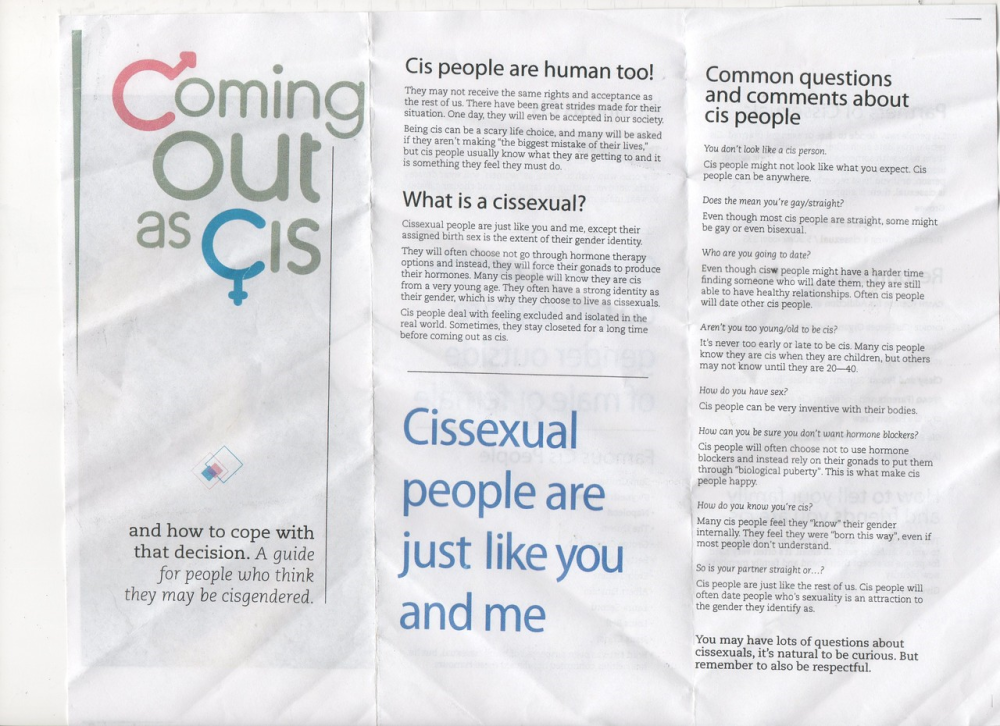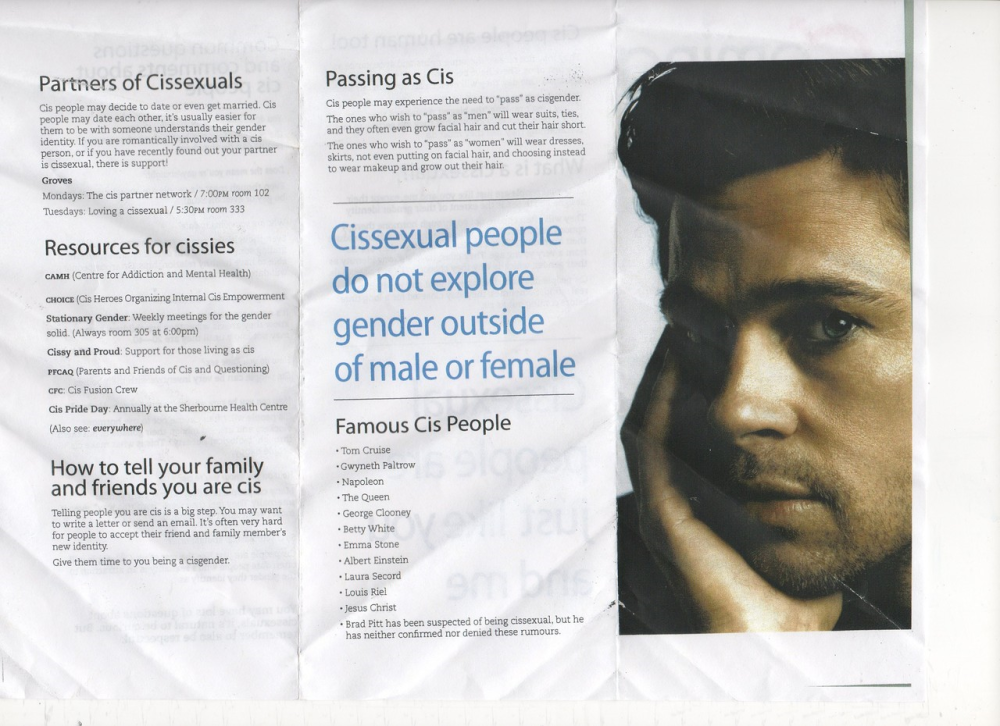By guest blogger Anya Callahan
The pro-choice movement is about bodily integrity and the importance of keeping decisions regarding individuals’ bodies autonomous. It is essential for the future of reproductive rights to recognize the intersectionality of women’s and transgender rights. The same sexist and cissexist system that is fighting for control over cis-women’s bodies, sexuality, and reproductive capabilities is simultaneously targeting the sexuality, identities, and reproductive rights of the trans community.
Cisgender is a term used to describe the gender identity of individuals who identify as the same gender/sex they were assigned at birth. Cisgendered individual’s perception and appearance of their gender fulfills the performance and expectations society considers appropriate and inline with their given biological sex. So, since I identify as a woman and I was born into a female body, I am a cis-female.
Our culture rewards cisgendered individuals and reinforces transphobia in many ways. Cis-gender privilege means you don’t have to worry about finding a safe and accessible restroom; strangers don’t confront you about your “real name” or ask you what your genitals look like; your validity as a woman or man isn’t based upon what surgery you’ve had and people don’t inquire about your surgical decisions; when initiating in intimacy you don’t have to worry about what your partner will think about your anatomy or if your relationship will cause your partner to question their sexuality—just to name a few.
Up until a couple months ago transgender identity was still considered a mental pathology by medical professionals, defined in the DSM IV as, “Gender Identity Disorder.” Though in December the American Psychology Association announced they were replacing the name to a less stigmatizing title, “Gender Dysphoria.” This medical diagnosis presents the question: what constitutes a “normal” gender identity? Innovative feminist and queer theory challenge the gender binary and tell us gender characteristics are socially constructed, therefore unrelated to biological sex.
While acceptance of the gender continuum is gaining mass cultural acknowledgement, there are still assumptions about the capabilities of transgender men and women’s bodies. Trans- individuals who need hormones or surgery are often pressured into fulfilling stereotypical gender roles: you must dress and act feminine or face not being considered a real woman/man. As you can imagine, when it comes to reproductive rights the complications with gender identity fortify.
Reproductive justice means speaking out against forces that aim to control individual’s bodies, fighting for trans men and women’s right to choose and integrating such issues into the greater pro-choice movement. “My body, my choice” must continue to be a beacon for all genders, despite individual’s perceived reproductive capabilities.
Many pro-choice organizations, locally and internationally, are fighting for comprehensive access to reproductive care regardless of socioeconomic status. The right to choose falls short when access is denied on the basis of income, and further, when income puts people in conflict with their very own perception of self. Both cis and trans individual’s right to reproductive health will remain theoretical unless economic justice becomes an integral part of the fight and the integration of trans-rights is accepted as part of the pro-choice mission.
Some trans men may wish to bear children and continue to identify as a male, while others may feel at odds with their biological capabilities and view childbearing as foreign to their own identity. Due to the cissexism and transphobia within our society, trans individuals are often discriminated against in the workplace. The National Center for Transgender Equality and National Gay and Lesbian Task Force, published an eye opening report which found that trans “individuals make $10,000 a year or less at twice the national average,” and have a harder time finding employment—meaning they are less likely to have access to health care.
Access is something that needs to be allotted to everyone, including those who do not connect with their reproductive capabilities and do not wish to endure the plight of childbirth. The pro-choice movement has done the work to secure many women the right and access to reproductive care; now in the heat of health care reform debates it is more important than ever that trans individuals are not forgotten in the fight.
The Natalie Reed’s article Five Ways Cis Feminists Can Help Build Trans Inclusivity And Intersectionality explains, “It’s never the job or ethical responsibility of the victims of oppression to end it. In fact, oppression operates in exactly such a way that even if it were the victims’ responsibility to end oppression, they wouldn’t be empowered to do so. The obligation (and power) always rests on the shoulders of the oppressor and those privileged by the oppression to end it.” This article emphasizes that it is important for cis-feminists to be eager to confront cases of transphobia and not take a passive approach in doing so, to acknowledge that all feminist dialogue should include trans voices, to proactively seek out transgender voices, and not to assume gender as binary in nature. By being a vocal advocate for trans rights, comprehensive reproductive rights for all can begin to become a reality.


